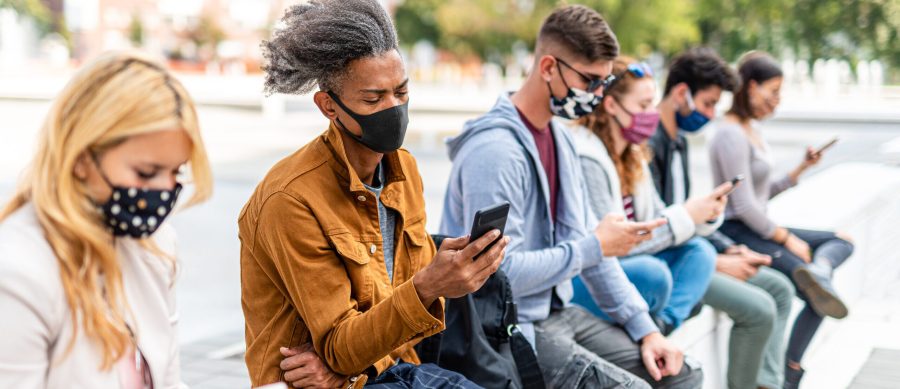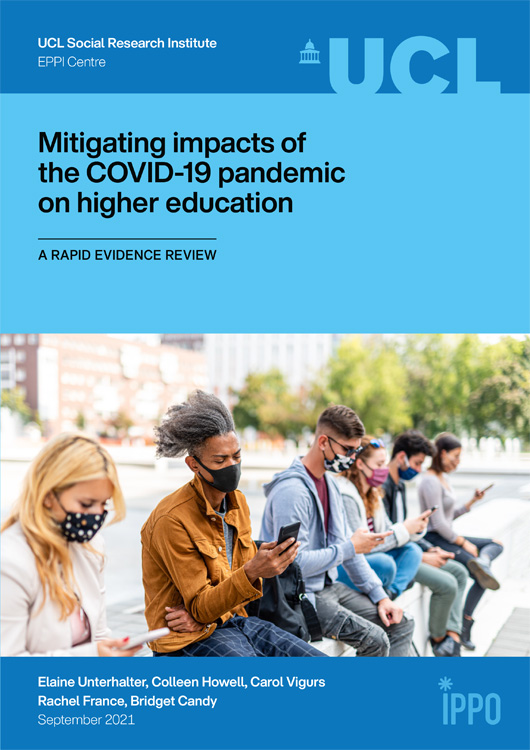Rapid Evidence Review: The impact of the pandemic on the UK Higher Education sector and its students

This review was commissioned by the UK Government’s Department for Education (DfE) following a recommendation from the Scientific Advisory Group for Emergencies (SAGE). It was managed by the EPPI-Centre at UCL. Click here for the full review
- IPPO Rapid Evidence Review summaries: Schools / FE / HE / Parents & carers
Summary of findings

This IPPO rapid evidence review pulls together evidence from 38 studies relating to harms to UK Higher Education (HE) during the pandemic, and 39 systematic reviews of existing evidence of potential mitigation strategies together with 13 empirical studies of responses to disasters and pandemics, notably floods, earthquakes, HIV and SARS.
While the most immediate impacts typically relate to students – including pronounced negative effects on their mental health, learning and finances – other impacts are likely to be felt in time, such as the effects on research programmes generating new knowledge and on initiatives aimed at widening access to HE. Specifically, there is evidence for COVID-related impacts on higher education in the following areas:
Impacts on access to Higher Education
- The pandemic has caused widespread disruption to initiatives designed to widen participation among students from disadvantaged groups – including programmes aimed at encouraging historically excluded groups from applying to university.
- Changes to school-leaving examinations during the pandemic saw students from Black, Asian and Minority Ethnic communities, and those from lower socioeconomic status backgrounds, achieve lower grades in 2020 compared with BAME students in the 2016 benchmark cohort.
- An April 2020 survey of people applying to university found those from working-class backgrounds were more likely to be considering changing their plans to attend university as a result of the pandemic.
- These issues, combined with existing problems such as the proportionally higher cost of university education for people from medium- and low-income families, present a significant barrier to widening access to HE in the wake of the pandemic.
Impacts on students’ mental health and wellbeing
- The multi-faceted impacts of the pandemic had a pronounced effect on HE students’ mental health and wellbeing. Contributing factors include impacts on their social life, anxiety about future work prospects, and worries about their finances as many part-time jobs typically undertaken by students dried up (such as in the hospitality sector).
- Doctoral students who largely work on their own, with (at best) monthly supervision sessions, were identified as particularly vulnerable to wellbeing declines because of difficulties accessing supervision and disrupted research plans.
Impacts on the quality of learning
- The COVID-induced shift to online learning in the HE sector was not necessarily associated with poor progress or diminished understanding. However, greater reliance on digital technology creates patterns of inequality that have the potential to exclude groups of learners – an issue that is likely to endure beyond the pandemic.
- While online learning was found to improve peer mentoring for medical students, this was not a substitute for all the practical experience that was lost in the same period. Not being able to take part in practical sessions – for example, in a laboratory or studio – was the part of their courses most missed by students generally.
- Similarly, the training of other healthcare workers was affected by limited opportunities for practice-based learning, particularly in surgical specialities. There was a similar effect on trainee teachers due to school closures.
Impacts on future job and research prospects
- This review highlights both significantly reduced job opportunities for graduating students, and also disrupted research agendas – particularly research involving fieldwork. However, it is too soon to assess what long-term changes there are to what is learned in universities.
- In particular, it highlights the interconnectedness of the HE sector with other parts of the education system and also the healthcare sector. Negative impacts of HE closures were particularly strongly linked to the training of both teachers and healthcare workers.
Mitigation strategies
This review highlights a number of potential mitigation strategies including:
- To mitigate the effects of disruption on initiatives designed to widen participation and improve HE access for students from historically excluded groups, evidence shows that a mix of mentoring and support with university entrance applications is more effective than simply providing students with general information.
- Financial incentives or support – either on their own or combined with information, motivation and support – are also highly effective in this area.
- Expanding provision of easily accessible, short-term interventions for mental health problems – including Cognitive Behavioural Therapy (CBT), psychosocial support and mindfulness – is found to have a modest positive impact on recovery among HE students.
- For students whose job opportunities have been reduced because of disruption to their courses, there is evidence for schemes that support graduates into work through partnerships with employers.
- Evidence from recovery from other disasters suggests that establishing a planning process to deal with future pandemics is essential.
Other considerations for policymakers
- To what extent, and with what effects, will online and asynchronous learning play an increasing part in Higher Education provision during the pandemic recovery and beyond?
- What forms of ‘catch-up’ strategy are needed to mitigate the lost HE training identified by these studies?
- What steps should be taken to support students who have had multiple (intersecting) impacts of the pandemic, including those with limited access to online learning tools or high levels of debt?
- What learnings are there for the university teaching and research sectors in terms of building resilience against future disruptions?
APPENDIX
Topic specialist review authors
Professor Elaine Unterhalter and Dr Colleen Howell (both UCL Institute of Education). These authors were supported by review specialists Carol Vigurs and Dr Bridget Candy (EPPI-Centre) and Dr Rachel France (IPPO).
Notes about this review
The UK Government’s Department for Education (DfE) funded this work following a recommendation from the Scientific Advisory Group for Emergencies (SAGE).
The work was undertaken under the umbrella of the ESRC-funded International Public Policy Observatory (IPPO) and managed by the EPPI Centre, a specialist centre in the UCL Social Research Institute which develops methods (i) for the systematic reviewing and synthesis of research evidence; and (ii) for the study of the use of this research.
The review’s authors note that many of the effects on Higher Education are still emerging, as in some cases there have been limited opportunities for rigorous documentation of changes relating to the pandemic closures.
This is one of four education-focused Rapid Evidence Reviews that IPPO is publishing today. The full list of reviews is as follows:
- The Impact of UK School Closures on Children during the COVID-19 Pandemic
- The Impact of the Pandemic on the UK Further Education Sector and its students
- The Impact of the Pandemic on the UK Higher Education Sector and its students
- The Impact of Lockdowns and School Closures on Parents and Carers in the UK
